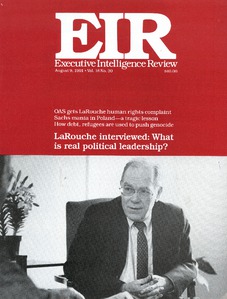Interviews
Franjio Golem
The new official representative of the Republic of Croatia in the United States and Canada discusses his country’s aspiration for freedom and independence.
Josip Svitan
The vice president of the Croatian Democratic Party tells why he thinks more Croatians should be as outspoken as he.
Book Reviews
Organized Crime’s Hostile Takeover of the U.S. Economy
by Harley Schlanger
Junk Bonds: How High Yield Securities Restructured Corporate America, by Glenn Yago; and The Money Machine: How KKR Manufactured Power and Profits, by Sarah Bartlett.
Departments
Dateline Mexico
by Carlos Cota Meza
Salinas Betrays Foreign Investment Law.
Report from Bonn
by Rainer Apel
Can Germany Escape a Deep Recession?
Northern Flank
by Poul Rasmussen and Michelle Rasmussen
Bush’s Policy Under Fire in Denmark.
Report from Rio
by Silvia Palacios
Greenies Only Need Apply.
Panama Report
by Carlos Wesley
Still More Drugs.
Editorial
August 15, 1971: Twenty Years After.
Investigation
U.S. AID to Central America: Swap Debt for Birth Control
by Gretchen Small
The State Department’s Agency for International Development is drawing up plans to transfer debt titles into financing for “family planning” programs—otherwise known as genocide.
FAIR Refugee Policy ‘Reform’ Would Aid Genocidalists
by Leo Scanlon
The Federation for American Immigration Reform wants to limit refugees admitted to the United States, to the point that Chinese families fleeing the communist government’s one child per family policy would be excluded. The motive: population control.
Racialist Kooks behind FAIR and Immigration ‘Reform’
Human Rights
LaRouche Files Human Rights Complaint with the OAS
LaRouche and five people who were convicted along with him on trumped-up charges, have submitted a complaint to the Organization of American States, charging the U.S. government with human rights violations “to silence the voice of presidential candidate and economist Lyndon H. LaRouche, and to bankrupt, through financial warfare, the political movement associated with him.”
Economics
Sachs Mania Runs Wild in Poland: A Tragic Lesson
by Konstantin George
Thanks to the austerity policy dictated by Harvard’s Jeffrey Sachs, Poland has been forced to shut down one of the flagships of its industry, the Ursus tractor factory, largest in eastern Europe. Thousands have been laid off, and more layoffs loom. Where, then, is the “reform”?
Vienna, at Crossroads of Europe, Gets Report on LaRouche ‘Triangle’ Plan
Currency Rates
BCCI: The Truth, But Nowhere Near the Whole Truth, Comes Out
by Jeffrey Steinberg
Harvard Shock Troops Storm Mongolia
by Michael Billington
Banking
by John Hoefle
Mergers Help Bush’s Texas Buddies.
Agriculture
by Marcia Merry
Iraq Has No Food Reserves.
Business Briefs
Feature
LaRouche Interview: What Is Real Political Leadership?
by Lyndon H. LaRouche, Jr. and Dr. Julio Hazim
From an interview with Lyndon LaRouche conducted by Dominican Republic television journalist Dr. Julio Hazim. Why is LaRouche in prison, and what are the chances of his getting out? Should the Third World pay its debt? Aren’t there too many people in the world? What does the Anglo-American establishment really want anyway, with its “new world order”? These, and many other questions are discussed in this wide-ranging dialogue with the Democratic precandidate for the presidency of the United States in 1992.
International
Moscow Summit Pact Was Sealed in Blood
by Christopher White
As Lithuanian border guards were gunned down by Soviet troops, Bush and Gorbachov pledged to uphold the superpower condominium in a “new world order” of regional crisis management and spheres of influence.
‘Greater Serbians’ Seeking To ‘Restore’ 1915 Balkan Borders
by Mark Burdman
World War I Started at Fashoda, Not Sarajevo
by Dana S. Scanlon
Why Croatia Wants National Independence
by Umberto Pascali
‘Baker Is To Blame for Croatian Crisis’
Iraq’s Greatest Antiquities Were Also Targets of Desert Storm
by Nicholas Powell
A guest commentary.
Somalia Asks for Peace and Development
by Marco Fanini
Asean Strives To Keep Independence
by Lydia Cherry
International Intelligence
National
Bush Democrats Begin To Make Their Move
by Nancy Spannaus
Aspiring Democratic presidential candidates are inching toward an assault on an increasingly vulnerable George Bush, but Lyndon LaRouche is the only one to offer a real policy alternative.
Showdown Looms over Thornburgh Doctrine
by Leo Scanlon
Kimmitt Confirmed as Ambassador to Germany
by Scott Thompson
Judge Rules Medicaid Payment System Illegal
by Linda Everett
‘Cult Awareness’ Gang Gets Press ‘Exposure’
by Herbert Quinde
Congressional Closeup
by William Jones
National News



